Youth Programs
Specialized science, technology, engineering, and math-based workshops, field programs, and career training for students in grades K-20.
Classroom Workshops
TeWe are not scheduling any in-school workshops due to a lack of funding in 2024. Check back soon.
A strong basic understanding of concepts in science is crucial to every child’s academic development. Harbor WildWatch helps supplement this education by providing STEM workshops to students through the Harbor Outreach Program (HOP).
The core HOP workshops are presented in a series for 3rd through 5th-grade students that meet both state science standards and national STEM standards. Each series includes 3 workshops (60 minutes each) and builds on the previous lesson to create an easy transition between various topics. Each series is accompanied by a unique evaluation lesson to gauge students retention of the content.
These workshops are offered for free to public school classrooms in the Peninsula, Tacoma, Steilacoom, Bethel, University Place, Clover Park and South Kitsap School Districts. Workshops may be available for private schools with a small fee.
Teachers are encouraged to book workshops as far in advance as possible to ensure availability. Download the workshop synopsis below for more information or contact our Education Director, Rachel Easton, to schedule.
More About Classroom Workshops
This is a great series to start your classrooms exploration into environmental studies. Students learn about the types and formation of rocks, causes of erosion, plate tectonics, and the role glaciers played in the formation of the Salish Sea. Workshop topics include:
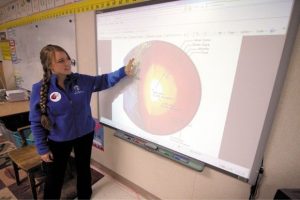
- Slip Sliding Away-Erosion: This lesson investigates the physics of gravity, friction and force between wind, water, wave, and chemical influences that formed the Salish Sea.
- Slip Sliding Away-Tectonics: This workshop continues the exploration into erosion via tectonic forces that deform and create new crust through a volcano model simulation and video examination.
- Movin’ Glaciers: This lesson explores glacial advances, retreats, and how ice has shaped our world using glacial erosion modeling.
This series explores the wonders of water and it’s impact on various habitats. Students observe the effects of pollution on a watershed, design and build a functioning wetland, and solve the mystery of the estuary by determining the density of various water samples. Workshop topics include:
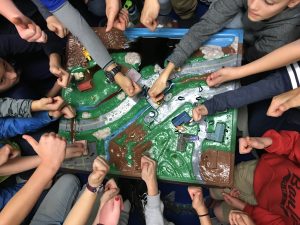
- The Watershed Model: This lesson investigates how the hydrologic cycle moves non-point pollutants from the mountains to the sea. Students learn how to define a watershed and how Puget Sound is affected by activities in the local watershed with a 3-D model. Strategies on how to mitigate human impacts upon the marine environment are investigated.
- Working Wetlands: Quagmire, marsh, slough, mudflat, and estuary; no matter what you call them, wetlands serve a vital role in the habitats of the sea and water quality. Through group competition, we see who can replicate the best working wetland.
- Estuary Mystery: Scientists have made a mistake in the lab and need junior scientists to identify where the water samples originated. Students will use test tubes to solve the mystery by examining salinity through the parameter of density.
Students learn about the incredible journey of salmon, follow the transfer of energy through Puget Sound’s food web, and design their own intertidal sea creature. Workshop topics include:
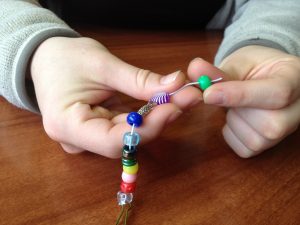
- Salmon Struggles: Salmon have long played an integral role in the history and prosperity of the Pacific Northwest. Learn how unique these indicator species are to our region, their importance to multiple ecosystems, and the obstacles they must overcome to survive by making a life-cycle bracelet.
- Energy through the Worldwide Food Web: The concept of energy addressed by building a marine food web, from base level producers through apex predator, using an interactive card game.
- Hold On To Your Home: Life in the intertidal zone can be harsh. Tides, weather, competition, predation, disturbance and succession all play a role in survival. We discover adaptations that make survival possible while determining ways for a “new” species to be successful in its niche and community.
 Skull Sleuths: A lesson in marine mammal comparative anatomy, told through our bone and fossil collection. Students draw clues from anatomy to match skulls with the animals they came from.
Skull Sleuths: A lesson in marine mammal comparative anatomy, told through our bone and fossil collection. Students draw clues from anatomy to match skulls with the animals they came from.- Squid Dissection: An introduction to dissection, students will explore this animal and its adaptations to life in Puget Sound. Students learn about digestive, reproductive, circulatory, and nervous systems of cephalopods
- Apex Predators: Students will become familiar with the adaptations that have helped sharks survive millions of years ago in the primitive oceans as well as today in Puget Sound. Comparisons to Orca whales and other apex predators will be discussed as well as the idea of biomagnification of toxins through the food web.
Field Courses
The Explorer Series provides meaningful opportunities for K-12 students to explore the natural world in an outdoor setting. Led by staff biologists, students will improve their knowledge of water quality, the water cycle, native plants, fish and wildlife habitat, salmon life-cycles, soil health, and climate change.
Workshops take place at a local beach, estuary, wetland, or forest where students have the opportunity to examine the role that habitat plays and how their actions can help protect it. The goals of this program are to:
- Increase eco-literacy
- Cultivate a sense of place
- Inspire future generations to be good stewards of the environment
These programs are provided free of charge for public schools thanks to our generous grantors within KGI, Puyallup, Nisqually, and Chambers Clover Creek Watersheds only. There is a suggested donation of $150 per class for private schools. Review our field course options below or contact our Education Director, Rachel Easton, to book your program!
More About Field Courses
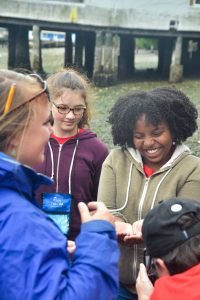 Late Spring (May and June)
Late Spring (May and June)
Students interact with a variety of marine invertebrates through guided beach walks with a staff biologist. Topics covered include tides, zonation, habitats, adaptation, reproduction, and proper beach etiquette. Must take place during low-tide event. Great for end of school year field trips. If transportation to a beach is not possible, digital options are also available.
- 5:1 student-chaperone ratio required
- 3 hours recommended (including lunch break)
- Maximum 150 students per day
Fall (November and December)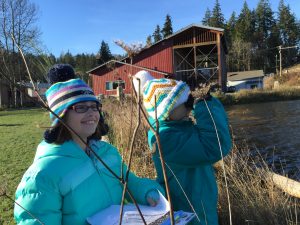
Students learn what makes a healthy estuary by investigating the animals that inhabit it including microinvertebrates, birds, mammals, and salmon! Interactive learning stations highlight a variety of topics such as water quality, restoration, and lifecycles.
- 10:1 student-chaperone ratio required
- 3 hours recommended (including lunch break)
- Maximum 75 students per da
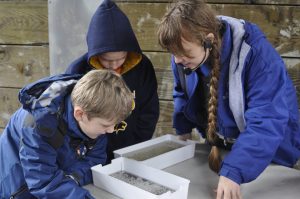 Early Spring (March and April)
Early Spring (March and April)
Students will learn what makes a healthy wetland and the role humans play in protecting this unique ecosystem. Led by a staff biologist, this tour investigates the plants and animals that inhabit this environment through a variety of learning stations.
- 10:1 student-chaperone ratio required
- 3 hours recommended (including lunch break)
- Maximum 50 students per day
Fall (Spring and Winter)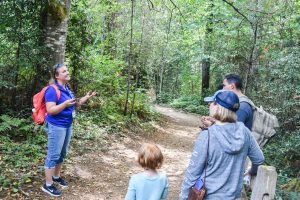
Students will learn what makes a healthy forest and the role humans play in protecting this unique ecosystem. Led by a staff biologist, this tour investigates the plants and animals that inhabit this environment through a variety of learning stations.
- 10:1 student-chaperone ratio required
- 3 hours recommended (including lunch break)
- Maximum 50 students per day
Paid Internship Opportunities
Harbor WildWatch’s vision is to be a catalyst for environmental education in our community. One way we can accomplish this vision is by training the future environmental educators of the world through our paid internship program.
This part-time, internship provides current or recently graduated students with experience they will need to enter the environmental education workforce. Our interns have the opportunity to choose from a wide variety of work experience programs, including:
- Youth education in the field and classroom setting
- Public environmental education activities
- Community science monitoring and analysis
- Volunteer management and development
- Print and digital marketing and promotions
- Non-profit fundraising and administrative functions
The ideal candidate is pursuing a degree (or is a recent graduate of) biology/marine science/environmental studies and has an interest in environmental education. Applicants should be organized, possess strong interpersonal skills, and thrive in a collaborative working environment. Interns work under close supervision of paid staff members and are required to travel to the Gig Harbor office. Exceptional interns are considered for paid staff positions, when available.
The 2023 Spring/Summer Internship position is open – Applicants should complete the Internship Application Form by 11:59pm, May 11, 2023.
Questions? Check out the Internship Job Description or fill out the inquiry form below.
On Hold - Junior Naturalist Workshops
Unfortunately, our Jr. Naturalist workshops are our pause in 2024. Stay tuned for other learning opportunities.
The goal of our monthly Jr. Naturalist Workshops is to inspire young people to be good stewards of the environment. Students will study various ecosystems and their connections to humans through STEAM (science, technology, engineering, art, math) activities.
These workshops are ideal for students who show a high level of interest in science and do well in a team setting.
Students must be age 6-12 and each workshop has a fee of $25. Workshops will take place at various local parks. Dates and times vary, so check the schedule carefully. (Discover passes are required for Washington State Parks.) Parents are welcome to attend alongside their children, or drop them off to learn with our biologists. Students may sign up for individual workshops or all 8. Spots are limited, so sign up today!
For more information, contact our Education Director, Rachel Easton.

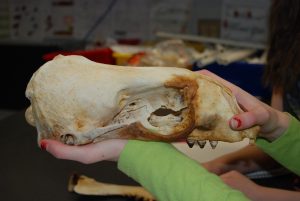 Skull Sleuths:
Skull Sleuths: